Hola Dannie here
With another AICN addition to our secret society of spies, introducing Precious_Roy! He sent in this write up on the new "Star Trek Discovery" show, now I know Xiola Bleu just wrote a write up, but this is a review by a seasoned Trekkie whom owned a Star Trek Concordance as a kid. So yeah, he has the Trek passion, and education to boot! Hope you all enjoy his fantastic write up!
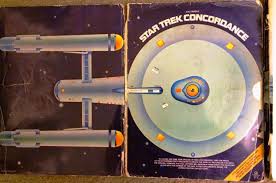
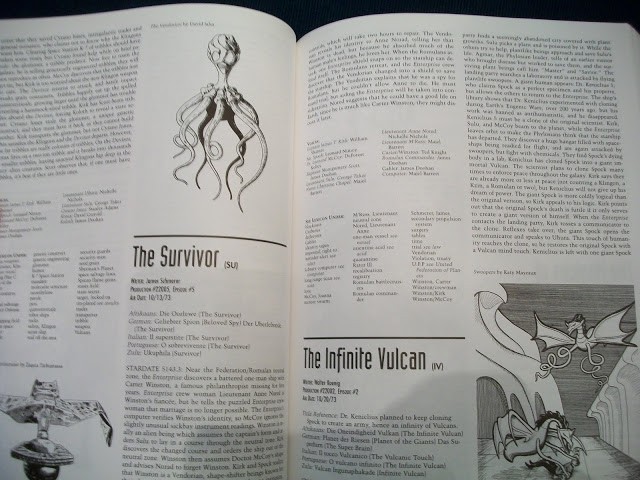
Precious_Roy reporting!
In the lead up to the premiere of Star Trek: Discovery, there was a lot of concern about a darker, edgier direction Star Trek was about to take. It’s very large fandom know that the Star Trek franchise is typically not about war, but often includes the tensions of war, or the struggle to avoid war. Some series have greatly dealt with the brink of war, such as Star Trek (The Original Series), or Star Trek: Deep Space Nine, which started with an armistice and slowly turned to war.
[This opinion/editorial will have a great many spoilers in it. I strongly recommend you go watch the first three episodes as soon as possible, or be prepared to have some plot elements spoiled.]
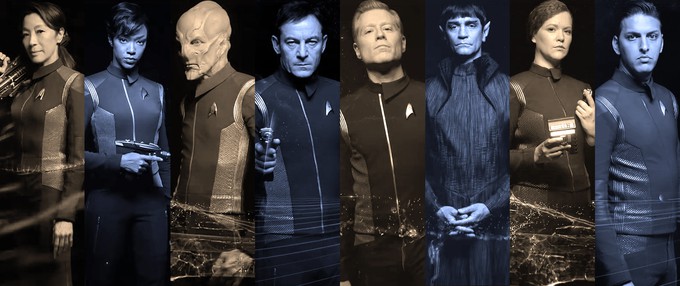
Full disclosure: as a fan of the Star Trek franchise who thinks Deep Space Nine was its finest hour, my two least favorite series have been Star Trek:Voyager and Star Trek: Enterprise—the penultimate and last series before Star Trek: Discovery’s premiere.
The Star Trek franchise has been going through its own struggle to come forward into today, and I think they’ve just made a wonderful start with Star Trek: Discovery. I would encourage everyone to watch it, despite what will likely come off as a very dark tone, to begin with.
The reboot/reimagine is beginning to become a Hollywood go-to as a means of restarting a dying franchise (Alien, Planet of the Apes, the X-Men), or to just milk a dead cow for all its worth (CHiPS, The Dukes of Hazzard, Halloween). While the studios have steadily polished their methods, the truth of the matter is that fandom hasn’t yet gotten in line with it, completely.
It’s a hard time for franchises trying to find new life in the age of streaming content and highly aware fanbases. Many DC Comics fans are still struggling to deal with the way Man of Steel (2013) attempted to remake Superman in the image of the much more popular Batman franchise. Granted, those changes were mostly superficial, but the representation matters to the fans. Superman is not a dark hero. He is a god with a known vulnerability and meant to be a lighter hero, and the better angel of our natures. We watch him because he represents the untouched purity of human goodness. The trouble is, fans stopped watching him and watched Batman, instead in the post The Dark Knight Returns years. DC correctly called the need to revamp him for film, even if they may not have found the perfect solution to the problem.
As a franchise, Star Trek has also experienced this tension between the reboot/reimagine and fandom expectations. The initial excitement over the Star Trek film franchise reboot waned with Star Trek: Into Darkness and the underperforming Star Trek: Beyond, and has taken a horrible gut-punch with the unexpected death of Anton Yelchin (Chekov). Star Trek needed to go back to television, and find its footing again.
My problem with the last two Star Trek television series lies in all-too-perfect captains. Captain Janeway’s jack-of-all-trades excellence served to make her crew moot at times—who needs a Torres when you already know the engines of an Intrepid-class ship inside and out? I suppose Archer had a ‘gee gosh’ element that just annoyed me—an element of reading Sam from Quantum Leap into the character at times, perhaps on the show’s part, perhaps as a sin for myself. And I was angered by the lazy steal of the Akira-class design for the ship, wishing they had just set a post-Voyager show and use the Akira-class then to steal, shrink, and wink at fandom. (Having written that, it’s weird looking back on how the structural design of the ship damaged the content of the show for me, but hey, that’s fandom for you.)
In terms of captains, I prefer the imperfect Sisco and Picard, who struggle to remain the best elements of humanity. (Seriously, I understand the irony in calling Sisco human, trust me.) I prefer Picard being awkward with children and dealing with the emotional ramifications of putting his girlfriend in harm’s way on away missions. I prefer Sisco’s temper getting the best of him and him realizing this and adjusting his game plan accordingly. I prefer Picard being crap with children and having a wunderkind child on board who correctly blames him for the loss of his father. I like these starship Captains to need their own personal growth, and to need the crews that support them.
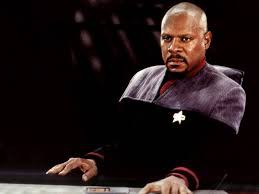
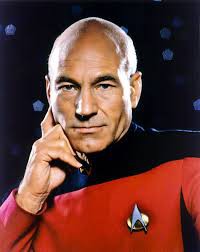
ST:D (ooooh, that’s a pun that’s gonna run and run—I’ll just say Discovery) is another prequel show, set between the Enterprise years and the original series, and initially does not begin on the Discovery itself, but in the back story and inciting incident that explains the current climate between the Alpha and Beta Quadrants and the conflict between the Federation and Klingons, post/pre empire.
The design of the U.S.S. Discovery is a mix of TOS elements and 2017, with a cutout area on the saucer that is more akin to the post-Star Trek: Nemesis days than the early years of the Federation. (I suppose Enterprise has taken the bullet for this, as I am now willing to accept 2017 design in pre-Kirk storylines without as much of a fuss.)
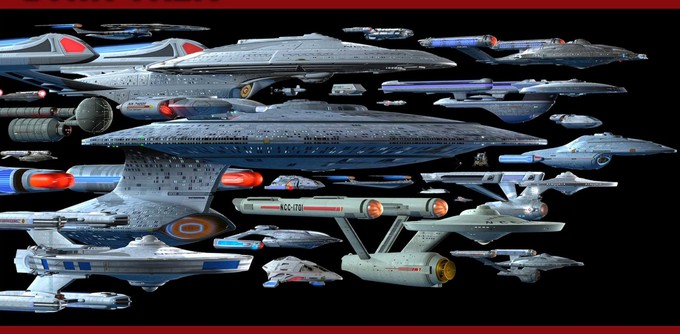
The ship’s crew is as diverse as you would expect, even more diverse than the NCC-1701 Enterprise that will turn up in another ten years. (Whether or not that will be the Shatner years or the Pine years, remains to be seen, but I am betting on the latter.) There will be openly gay characters on the Discovery, and their relationships will not be hidden in subtext or encoded. The lead herself is a Strong Black Woman who can point out the difference between racial and cultural context. One of the more interesting characters is a socially awkward science officer who is determined to be a Captain someday. (There are un-Pinocchio-like androids on starship bridges, too.) I guess this strong commitment to diversity may put some people off… but they happen to be people who have no reasonable claim to love Star Trek anyways, as at its heart, Star Trek is fundamentally diverse and inclusive.
Discovery is not about the making of the Federation, as Enterprise was-- it’s about an event that unmade the Federation, in many ways. The show begins with the post-Enterprise Federation—explorers and discovers in the universe—just doing a maintenance check on a damaged communications relay. We meet our main character, First Officer Michael Burnham (played by The Walking Dead’s Sonequa Martin-Green) and the crew of the USS Shenzhou, a warm, family-like crew of a Federation starship on the edge of the divide between the Federation and Klingon space. The Shenzhou’s captain, Philippa Georgiou (played to perfection by Michelle Yeoh), is a playful, clever, masterful captain who values her crew and creates a great atmosphere. The Science Officer, Saru, is a Kelpian, a newly-created race that can sense death and danger, and is the caution to Burnham’s reckless nature.
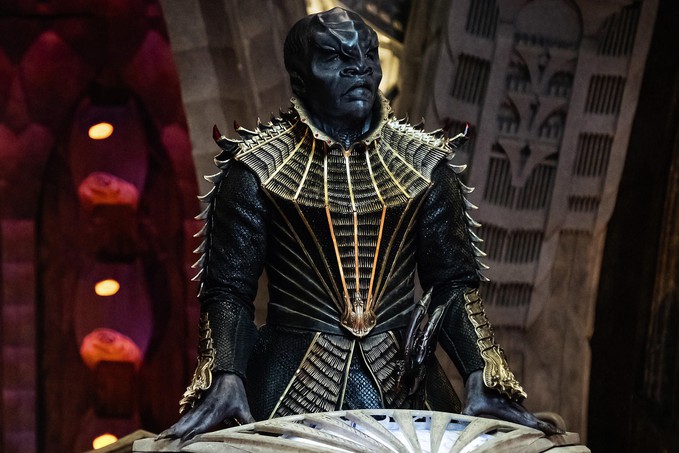
As the plot unfolds, we learn that the Federation are being set up for a violent conflict by a rogue element of the 24 Klingon houses, which are scattered and divided by conflicts. These are not the TOS Klingons, with their post-Eugenics Wars, smooth forehead appearances. These are wildly head-ridged, double-nostril, feral sounding Klingons.
(It’s interesting to note that they may be clueing us into how the smooth foreheads prevail, each time they say the phrase that unites their cause, “Stay Klingon”—perhaps this indicates that many houses have elected to not stay Klingon, and to adapt and evolve into the Eugenics-enhanced Kang we meet in TOS. It may also be a nod to something expressed during the dinner table scene in Star Trek: The Undiscovered Country, where a Klingon ambassador expressed concerns about the eradication of their culture.)
In communication with her mentor, Sarek (yes, Spock’s father), Burnham asks about the Vulcan solution to Klingon aggression, and Sarek gives her reluctant advice. Convinced that the Shenzhou is in immediate danger, Michael commits mutiny to save the Shenzhou, but is frustrated at phaser-point by Captain Georgiou. The situation escalates, and soon, war is declared between the Federation and the Klingon empire—a war that will likely be the majority of Discovery’s run.
The series takes place six months after these events, with Burnham, now a convicted mutineer in prison, finds herself drawn unwillingly into a science ship, the USS Discovery. There, she meets a Captain who is unorthodox and unlike Starfleet, who will likely encourage her to act upon her instincts, as she tried to do when she mutinied, in order to best the Klingons.
The Klingons of this time period are nearly an analogy of 1930’s Germany: they appear to be humbled and beaten by other nations, their proud empire shattered. Like the Nazis, these scattered Klingons unite under a banner of cultural purity; unlike the Nazis, the strongest of them, is not a racial purist. In this, they are more akin to the Taliban, taking the unwanted and discarded, and giving them new purpose. The Klingons want to Make Qo'noS Great Again buy sending the fairly colonial Federation a strong message, that ‘We Come in Peace’ will no longer believed, and are willing to do it with an act of war.
For their own part, the Federation comes off as the post-9/11 U.S. and the U.K.: colonials who good-naturedly want to absorb all cultures without understanding that some cultures don’t want you to save room for them in your democracy—they want you to get the hell out of their way. The Federation is putting ships out that work on black ops science projects to try and defeat the Klingons; the USS Discovery is one of those ships. The concept of a warship is a very anti-Roddenberry thing; this is a deviation from all we have seen before (with the exception of the USS Vengeance from Into Darkness).
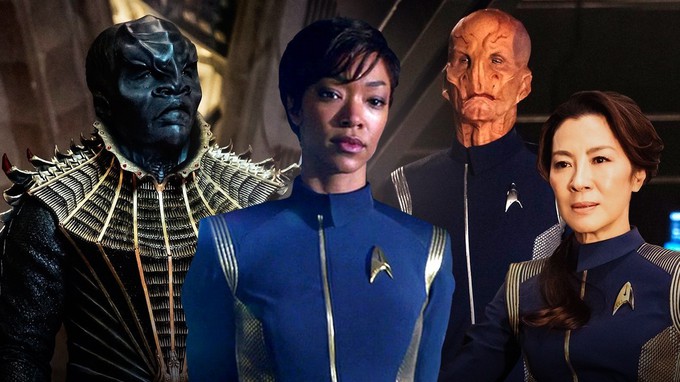
Every story is about change, even if the change fails—a protagonist’s journey to find identity, agency, fortune, or meaning. Captain Georgiou’s hard rebuke of Burnham for her ‘shoot first, ask questions later’ policy is the Archer-led Federation, the one that has put behind want and selfishness to build a great society. So Discovery is the abandonment of those key Roddenberry values, to better explain to the audience why they are so very important.
That might paint a rather bleak picture for you if you value the Federation from TOS, but consider this: the journey Burnham is on is one where she will grow. She has a dodgy captain, and a Jiminy Cricket alien to guide her. Star Trek fans who know the history of conflict between the Federation and the Klingons will likely surmise that “the Vulcan Hello” Burnham suggests would have likely worked, but it would have forever marked the Federation to the Klingons as a sly, covetous, dishonorable group. Over the course of the series, we are moving to Burnham coming to realize Georgiou was correct: the Federation are not the Vulcans, and those idea do not translate; the Federation is great not because it wins or survives, but because it remains true to its nature and its values.
As I said, Discovery is not about how the Federation came to be; it’s actually about where the human race are in the world right now, on different continents. We’re at war. We’re scared. We only care about winning at any cost. We’ve lost the lessons of our humanity, those things that actually do make the human race great—things that inspired Roddenberry to first create Star Trek.
There has some talk that Discovery is remaking the Star Trek franchise into something Gene Roddenberry would have fundamentally disagreed with. I have watched the first three episodes, and I am eager to see episode 4. I think if Gene had not retired from producing and survived to 2017, he would be appalled at first at Michael Burnham and her actions, but by episode 3, would be satisfied that his vision will carry on well into the next 100 years. I think the story is a glorious representation of all of Gene’s ideas, and would have been the better way to tell the story of Captain Kirk: instead of beginning with the perfect mix of swagger and reason, make Kirk swagger, and learn in time to reason. That’s Burnham. She has cold logic to guide her to the Machiavellian choice, but lacks wisdom to understand heroism.
I wouldn’t wait to get on board with Discovery. I would trust it to lead us to good places over the coming years. Take the plunge now.
Precious_Roy
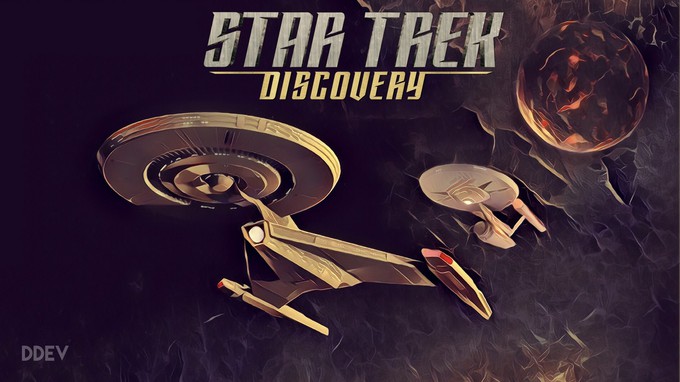
Thanks for the extensive and passionate review can not wait to read more from you!
Live Good, Love Movies!
Dannie aka Pekosa Peligrosa aka Sister Satan
